Self-discipline isn’t making one great decision and having it done. It’s something you must choose to do over and over. It is doing in the moment that which will bring you closer to what you truly want. You know what that is and you know what you should do. Self-discipline helps you do it.
Fix the Hole
A young man began his first job, working for his neighbor. At the end of the work day, his neighbor gave him five coins. But when he stopped at the market to buy food, he only had two coins. “I can’t exist on this,” he thought. “I’ll need to get a second job.” So he got another job working for a second neighbor.
At the end of his work day, the original neighbor paid him five coins. Then the young man went to the other neighbor and worked for him and was given five more coins. But when he stopped at the market, again he only had a couple of coins.
The young man went home in despair. He told his mother what happened. “What will I do now?” he wailed. “I can’t work three jobs!” His mother had the young man turn out his pocket. It had a big hole in it. “If the coins keep falling out of the hole in your pocket,” his wise mother said, “the answer isn’t to go get another job. The answer is to fix the hole!” [1]

Why You Need Self-Discipline
“The ability to concentrate single-mindedly on your most important task, to do it well and to finish it completely, is the key to great success, achievement, respect, status, and happiness in life.” ~ Brian Tracy
“The key to success is action,” writes Brian Tracy in Eat That Frog. And the key to action is self-discipline – doing what you say you will do. Without self-discipline, you have no power. [Sterner] Without self-discipline, you will not accomplish all you are capable of.
Self-discipline isn’t about doing things in the hardest way possible but about doing hard things as soon as possible. [Vaden] It is the ability to take action regardless of what is going on around you or inside you.
The more you practice self-discipline in any area, the easier it becomes to do what you say you will do. It’s plugging the hole in your pocket rather than trying to earn more and more coins.
Why is this important?
“Imagine what you could accomplish if you could get yourself to follow through on your best intentions no matter what. ” ~ Rory Vaden
The law of the harvest says, “Whatever one sows, that will he also reap.” [Galatians 6:7 ESV]. We also know this as cause and effect; you get out what you put in. As you develop self-discipline, you do more of the things that bring your goals closer to you and fewer things that lead you off the path.
Every day and sometimes moment to moment you must choose between doing what is right and necessary and often hard and doing the fun, easy things that have little value. What you sow, you’ll reap. Self-discipline allows you to make the right choices more often.
Ways To Develop Self-Discipline
Think long-term. You make the decision about what to do moment to moment, but the decision should be made in the context of what you want in the future. Think about yourself and your life five, ten, even twenty years from now. What do you want to have accomplished by then? Now, what do you need to do right now, in this moment, to move toward that future? Without that long-term destination in mind, you’re more likely to choose the fun, easy things that bring you pleasure right now over the hard but necessary things that lead to your desired future state.
Develop clarity of purpose. Confusion, fuzzy thinking, vagueness, ambiguity bring muddled thinking and disordered actions. It is difficult to know what you must do when you don’t know what you want. The clearer your objectives become, the easier it is to make the right decision in the moment.
Put first things first. Once you are clear on what you want, make that your highest priority. Then do what you can right now. If you aren’t working on your #1 priority, you are being distracted. [Vaden] As you develop self-discipline through practice, you begin to tackle your highest priority task more often than not. Knowing what your “first things” are and making them your top priority are essential for self-discipline.
Get busy. Once you are clear on your goals and you have determined your top-priority task, get busy on that. Procrastination is a killer of productivity. The faster you get started, the less self-discipline you must exert. The longer you delay, the longer you put off doing what you know you need to do, the more difficult it is to get started and the more self-discipline you’ll need.

Pay the rent every day. “Success is never owned — it is only rented — and the rent is due every day.” ~ Rory Vaden
One reason it is important to get busy on your highest priority task is due to the “law of diminishing intent”. You may start a project fired up and motivated but unless you commit to the project, again and again, day after day, your motivation will flag and your intention will fade. It’s one of the big reasons our New Year’s resolutions fail so often. We don’t do the work every day to keep them foremost in our consciousness. We don’t, in the words of Rory Vaden, pay the rent every day.
Actions
“It’s not that you don’t know what to do, but rather that you don’t have the discipline to make yourself do what you should do, whether you feel like it or not.” ~ Unknown
Here are some ideas to help you begin to build and strengthen your own self-discipline.
Do what you love. Success will follow. Success, not necessarily in terms of money, fame, health, or wealth, but success in loving what you do and doing what you love. Carol Dweck writes in Mindset: “The growth-minded athletes, CEOs, musicians, or scientists all loved what they did, whereas many of the fixed-minded ones did not. Many growth-minded people didn’t even plan to go to the top. They got there as a result of doing what they love. It’s ironic: The top is where the fixed-mindset people hunger to be, but it’s where many growth-minded people arrive as a by-product of their enthusiasm for what they do.”
If you’re focused on the outcome, you only succeed when you reach that specific result. If you fail, you feel your efforts are wasted. But if you focus on doing something because you love to do it, you’ll value your efforts regardless of the result.
Focus on the work. When you let go of the outcome goal, staying with the process becomes a goal that you achieve minute by minute. You don’t have to “make yourself” win the goal, you allow yourself to do what you can do in this moment. [Sterner]
Develop a bias for action. “You must develop a lifestyle of action,” writes Rory Vaden. “You must commit to action. You must embrace action. If you act, if you do, if you move, then you can have anything you want.” But, he continues, “If you do not act, if you do not do, if you do not move, then you shall not have.” As you develop self-discipline, you take more action. And as you take action, your self-discipline grows stronger.
Do or Do Not
“The gift of self-discipline is that it has the power to take you beyond the reasoning of temporary emotion to freedom.” ~ Michael Beckwith
It’s time to stop burning brain power to come up with elaborate justifications and excuses for not taking action, for not doing what you say you’ll do. Do something! Do anything, but get busy. As Brian Tracy says, “Losers make excuses; winners make progress.”
Self-discipline isn’t making one great decision and having it done. It’s something you must choose to do over and over. It is doing in the moment that which will bring you closer to what you truly want. You know what that is and you know what you should do. Expressing self-discipline means you do that thing, your thing, more often than not. And that is embracing your Excelerated Life™!
What could you do if you developed just a little more self-discipline?
Share your thoughts by leaving a comment below.
Excelerated Self-discipline™ — doing what you say you will do — is one step in creating your Excelerated Life™, a life of flourishing and well-being, and a life of meaning, purpose, and service.
Read more about the Excelerated Life™.
Footnotes:
[1] I got the idea for this story from Why Your Life Sucks by Alan Cohen.
Resources:
Beckwith, Michael Bernard. Spiritual Liberation: Fulfilling Your Soul’s Potential. New York: Atria Books, a Division of Simon & Schuster, 2008.
Cohen, Alan H., Why Your Life Sucks. New York: Bantam Books, an imprint of the Random House Publishing Group, 2005.
Dweck, Carol S. Mindset. New York: Ballantine Books, an imprint and division of Penguin Random House LLC, 2006, 2016.
Sterner, Thomas M. The Practicing Mind: Bringing Discipline and Focus Into Your Life. Novato, CA: New World Library, 2005.
Tracy, Brian. Eat That Frog! San Francisco, CA: Berrett-Koehler Publishers, Inc., 2007.
Vaden, Rory. Take The Stairs: 7 Steps To Achieving True Success. New York: Penquin Group, Inc., 2012.


